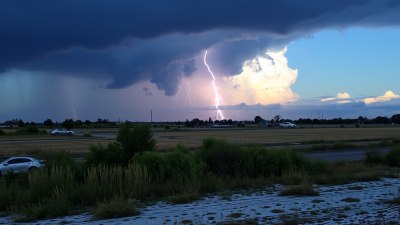Why the Air Sometimes Feels Like a Wet Blanket You Didn’t Ask For
Explore the factors causing humid air to feel suffocating and uncomfortable. Understand humidity and weather intelligently.

This image was created with the assistance of Freepik
Humidity is a term that often brings discomfort to many people, especially during the hot summer months when the air can feel thick and stifling. When we refer to air feeling like a 'wet blanket', we are describing a sensation caused by high levels of moisture in the atmosphere. This article delves into the science behind humidity, its effects on our comfort levels, and the environmental factors that contribute to this phenomenon.
Understanding Humidity
Humidity is defined as the amount of water vapor present in the air. It is measured in percentage terms and can significantly impact our comfort. There are two primary types of humidity: absolute humidity, which refers to the total mass of water vapor present in a specific volume of air, and relative humidity, which compares the current amount of water vapor to the maximum amount that air can hold at a given temperature. High relative humidity can make us feel uncomfortable, especially when the temperatures are high.
How Humidity Affects Comfort Levels
Human beings have a specific comfort zone regarding temperature and humidity. When the air is humid, our bodies struggle to cool down. Typically, we sweat to regulate our internal temperature; however, when the surrounding air is saturated with moisture, sweat does not evaporate quickly enough, leading to that unpleasant 'wet blanket' feeling. This can result in increased body temperature and feelings of lethargy and discomfort.
Factors Contributing to High Humidity
Numerous factors influence humidity levels, including geographical location, time of year, and prevailing weather conditions. Coastal areas often experience higher humidity due to proximity to large bodies of water, as evaporation increases the moisture content in the air. During summer months, higher temperatures lead to more evaporation, further elevating humidity levels. Additionally, weather patterns, such as low-pressure systems and tropical storms, can bring increased moisture to the air, exacerbating discomfort.
The Science of Humidity and Temperature
The relationship between temperature and humidity is crucial to understanding why we feel uncomfortable in humid conditions. Warm air can hold more moisture than cold air. As temperatures rise, the air's capacity to hold water vapor increases, potentially leading to higher relative humidity. This is why weather forecasts often refer to the 'heat index'—a measure that combines temperature and humidity to reflect how hot it feels outside.
Psychological Effects of Humidity
High humidity doesn’t just impact our physical state; it can also affect our psychological well-being. Studies have shown that uncomfortable weather conditions, particularly those involving high humidity and heat, can lead to increased irritability and decreased productivity. People may feel more lethargic and experience mood swings, leading to a negative impact on overall mental health during prolonged periods of high humidity.
Health Implications of High Humidity
High humidity can also have direct effects on health. For example, excessive humidity creates an environment conducive to the growth of mold, mildew, and dust mites, all of which can exacerbate allergies and asthma symptoms. The heat combined with high humidity can also lead to heat-related illnesses such as heat exhaustion or heat stroke, particularly if proper precautions aren't taken during extreme weather conditions.
Strategies to Combat Humidity
While high humidity can be unpleasant, there are several strategies that individuals can employ to help combat the effects. Using air conditioning can effectively remove moisture from the air, allowing for a cooler indoor environment. Additionally, portable dehumidifiers can help reduce humidity levels in specific areas of your home, making living spaces more comfortable. Staying hydrated is also crucial, as it helps regulate body temperature and supports the body’s cooling mechanism through sweat.
The Role of Nature in Humidity
Interestingly, natural environments can play a role in humidity levels. Dense forests, wetlands, and bodies of water can contribute to higher local humidity levels due to transpiration and evaporation processes. However, nature also provides solutions; spending time in shaded areas or near water can enhance cooling and offer a more comfortable experience, even in humid conditions.
Adapting to Humid Conditions
Adapting to humid conditions is key to improving comfort during the hot, sticky months. Wearing loose-fitting and lightweight clothing made from natural fibers like cotton can help your body to breathe better. Additionally, planning outdoor activities during cooler times of the day, such as early morning or late evening, can minimize discomfort and exposure to high humidity.
In conclusion, understanding humidity and its various effects on our body and psyche is vital. The sensation of air feeling like a 'wet blanket' stems from a complex interplay of environmental factors, physiological responses, and psychological implications. By recognizing these factors and employing strategies to manage humidity levels in their environment, individuals can improve their comfort and overall well-being. Embracing the challenges brought by high humidity, especially in our ever-changing climate, can empower us to adapt and thrive no matter the weather.











